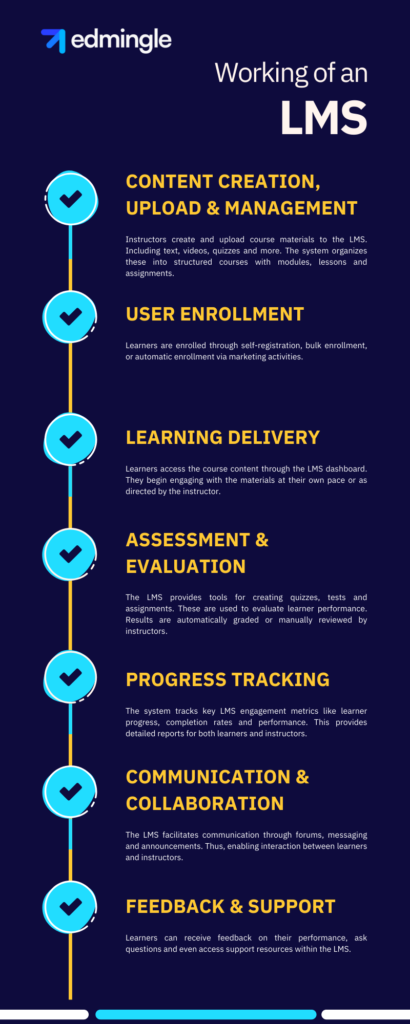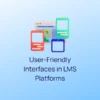
The LMS full form stands for a Learning Management System. Its a software designed to facilitate the administration & delivery of educational courses or training programs.
Serving as a centralized hub for training content, lessons, assessments & more. It provides a robust digital environment that is efficient & effective for it’s entire user base. Be it businesses, teachers or learners.
In this blog, we’ll give you a brief overview of what an LMS stands for. With its use cases, types, working, benefits & core features.
Use Cases of an LMS
- Schools, Colleges & Universities
- Customer Training
- Partner Training
- Professional Development
- Employee Upskilling
- Professional Development
- Law Teaching
- Hybrid/Blended Learning
- Selling Courses
- Compliance Training
- Business Training
- Language Teaching
- Healthcare & Hospitality Training
- Mobile & Remote Training
Explore LMS platforms in-depth with our blog on “what is an LMS?”.
Types of LMS
There are several types of learning management systems tailored to different needs. These vary in their server infrastructure, features, pricing, utility & more. Some of these are:
- Cloud-Based LMS (SaaS LMS)
- Self-Hosted (On-Premise) LMS
- Open-Source LMS
- Enterprise LMS
- AI-Powered LMS
- Mobile LMS
Explore all the major types of LMS.
Working of an LMS

Key Benefits of an LMS
- Centralized Learning
- Efficient Administration
- Cost-Effectiveness
- Flexible Access
- Scalability
- Consistent Training
Core Features in an LMS
- Course, User & Classroom Management
- Assessment & Quizzes
- Real Time Learner Progress Tracking & Reporting
- Communication Tools like Discussion Boards
- Mobile Application & Accessibility
- Compliance & Certification
- Customization & Branding
- Integration Capabilities
Explore all the learning management system features.
LMS Standards
LMS Standards refer to a set of guidelines & specifications that ensure learning management systems are interoperable, scalable & efficient in delivering educational content. These standards enable seamless integration between different LMS platforms, e-learning content & third-party tools.
Some of the Key LMS standards include:
- SCORM (Sharable Content Object Reference Model)
- xAPI (Experience API / Tin Can API)
- LTI (Learning Tools Interoperability)
- AICC (Aviation Industry CBT Committee)
- cmi5
Read in detail about SCORM compliant LMS platforms.
LMS Pricing Models
LMS pricing varies depending on the target audience (individual educators, businesses, or large enterprises), features & scalability. Below are the common pricing models for LMS platforms:
- Subscription-Based Pricing (SaaS Model)
- Per-User Pricing
- Per-Active-User Pricing
- One-Time License Fee (Perpetual License)
- Freemium Model
- Custom Pricing (Enterprise LMS)
Read in-depth about all kinds of LMS pricing models.
LMS Demos
An LMS demo is a presentation of a learning management system that showcases its features, functionalities & user experience. It helps potential customers evaluate whether the LMS meets their training or business needs before making a purchase decision. Types of LMS Demos:
- Live Demo (Sales-Led Demo)
- Pre-Recorded Video Demo
- Interactive Sandbox Environment
Explore about LMS demos in our blog.
LMS Free Trials
An LMS free trial allows potential customers to explore the platform before committing to a purchase. It helps businesses evaluate key features, user experience & suitability for their training needs. Types of LMS free trials:
- Limited-Time Free Trial
- Freemium Model
- Feature-Limited Free Trial
- User-Limited Free Trial
Read more about LMS free trials.
LMS Examples
- Edmingle
- Docebo
- TalentLMS
- Abara LMS
- Bridge LMS
How to Choose an LMS?
Selecting the right learning management system depends on various factors, including business goals, user requirements, and budget. Here’s a structured approach to choosing an LMS:
- Step 1: Define Your Goals & Requirements
- Step 2: Evaluate Key LMS Features
- Step 3: Compare Pricing Models
- Step 4: Request a Demo or Free Trial
- Step 5: Read Reviews & Case Studies
- Step 6: Make a Decision & Implement
Where to Find LMS Reviews?
When evaluating an LMS, reading authentic reviews from real users can help you make an informed decision. Here are the best sources to find LMS reviews:
- Software Review Websites like G2, Capterra, Trustpilot, Software Advice & GetApp
- LMS Vendor Websites
- Reddit & Quora Discussions
- LinkedIn & Facebook Groups
- YouTube LMS Reviews & Demos
- Industry Reports & Analyst Reviews like eLearning Industry, Brandon Hall Group & Forrester & Gartner Reports
- Peers & Professional Networks
Summary on LMS Full Form
So while the LMS full form stands for learning management systems. It touches on all aspects related to education, training, upskilling & more.
From academic & corporate learning to professional development & customer education. LMS platforms transform how we approach learning. All while making it accessible, flexible & more enjoyable.
The key benefits highlight why LMS platforms are indispensable. And with the right features, it can ensures a seamless learning experience. So if you’re looking to enhance your training initiatives, this tool can be a game-changer.
FAQs on Full Form of LMS
1.How did the term LMS originate?
The term originated in the early 2000s. As educational institutions & businesses began adopting digital tools to manage & deliver training & educational content.
2.How does it differ from traditional classroom learning?
An LMS allows for flexible, self-paced education that can be accessed at anytime, from anywhere. In contrast, traditional classrooms require physical attendance at set times & locations.
3.Can an LMS be customized to fit specific organizational needs?
Yes, many LMS platforms offer customization options. This includes branding, course structures and user roles.





Leave a Reply